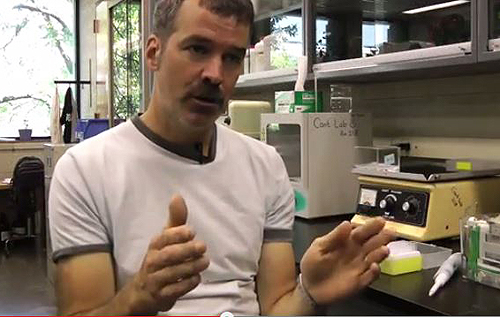By Alaina Osborne, Students Promoting Awareness of Research Knowledge (SPARK)

Cows can now produce milk that is not only good for you, but has anti-cancer effects as well.
The secret is selenium, an essential mineral needed by living organisms to stay healthy. When U of G researchers fed cows selenium in its organic form (produced by yeast) the mineral was absorbed and incorporated directly into milk casein, a type of protein.
The researchers discovered this selenium-enriched casein has the ability to reduce human breast cancer tumours.
“With each increase of selenium, tumour growth dropped,” says animal and poultry science professor John Cant. “We saw the anti-cancer effects at every level.”
He and graduate student Jenny Warrington first began exploring the effects of selenium yeast in cow diets two years ago, after PhD candidate Scott Cieslar suggested studying selenium-enriched milk casein at Guelph.
Their studies used human breast cancer cells transplanted into mice, so the researchers could look specifically at how the human cells grew.
They created four different diets containing low to high levels of selenium.
Those diets with high amounts of selenium were proven to have the greatest impact on the size of tumours.
However, Cant was surprised that even in low doses, the effects of selenium-enriched casein were significant and believes it could be used in addition to chemotherapy.
Cant says the general public can also benefit from an organic selenium boost. Even though it’s an essential mineral, selenium is difficult to incorporate into many types of foods. Research has been done on selenium-enriched broccoli, but milk products would offer a wider variety of ways to introduce selenium into the diet of the general population.
Another advantage of organic selenium is that it is safer to consume in high amounts than selenium salts (the inorganic version of the mineral, which in high doses can cause health problems).
Cant says more studies are needed to determine exactly how selenium acts as an anticarcinogen, but its effects are evident.
“We’re excited about what this product can do,” he says. “We have real results.”
This research is supported by the Dairy Farmers of Ontario, Alltech Inc., and the Natural Sciences and Engineering Research Council.
For more information, visit http://www.uoguelph.ca/research/new-sparkair-release-john-cant-selenium-dairy-cattle.